Assessing COVID-19 Impact on UK Economy & Government's Responses
VerifiedAdded on 2023/06/15
|11
|3870
|96
Report
AI Summary
This report analyzes the impact of the COVID-19 pandemic on the UK economy, focusing on the effects of lockdowns and the government's economic responses. It examines the impact on various sectors, including public finances, tourism, and employment, using the circular flow of income model to illustrate economic changes. The report details the UK government's fiscal and monetary policy interventions, such as the Coronavirus Job Retention Scheme (CJRS) and the Self-Employment Income Support Scheme (SEISS), as well as the Bank of England's measures, including interest rate reductions. It further discusses the impact of Brexit on the UK's economy and provides recommendations to mitigate the adverse economic effects of these events. This analysis highlights the challenges and strategies employed to maintain economic stability during unprecedented times.
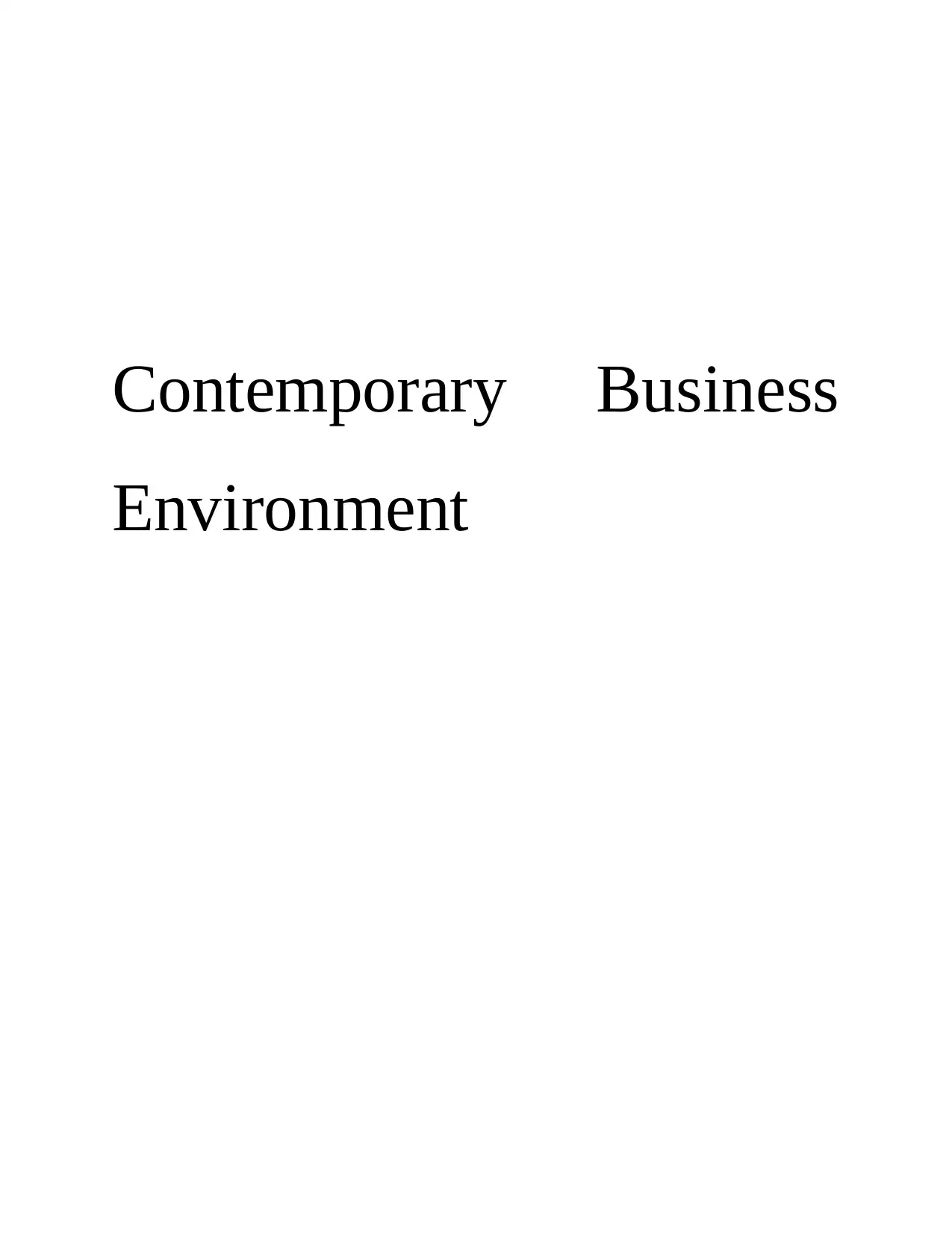
Contemporary Business
Environment
Environment
Paraphrase This Document
Need a fresh take? Get an instant paraphrase of this document with our AI Paraphraser
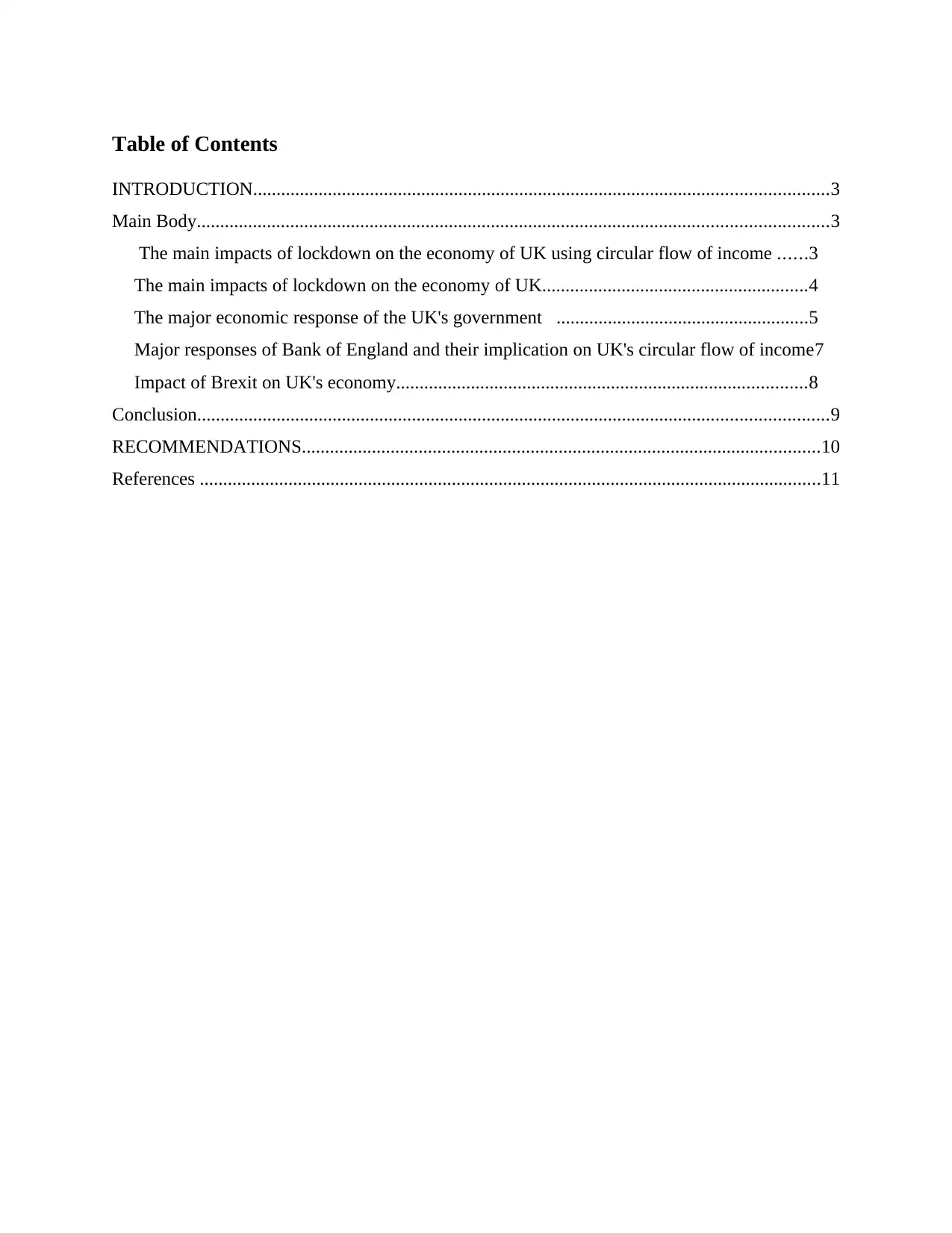
Table of Contents
INTRODUCTION...........................................................................................................................3
Main Body.......................................................................................................................................3
The main impacts of lockdown on the economy of UK using circular flow of income ......3
The main impacts of lockdown on the economy of UK.........................................................4
The major economic response of the UK's government ......................................................5
Major responses of Bank of England and their implication on UK's circular flow of income7
Impact of Brexit on UK's economy........................................................................................8
Conclusion.......................................................................................................................................9
RECOMMENDATIONS...............................................................................................................10
References .....................................................................................................................................11
INTRODUCTION...........................................................................................................................3
Main Body.......................................................................................................................................3
The main impacts of lockdown on the economy of UK using circular flow of income ......3
The main impacts of lockdown on the economy of UK.........................................................4
The major economic response of the UK's government ......................................................5
Major responses of Bank of England and their implication on UK's circular flow of income7
Impact of Brexit on UK's economy........................................................................................8
Conclusion.......................................................................................................................................9
RECOMMENDATIONS...............................................................................................................10
References .....................................................................................................................................11
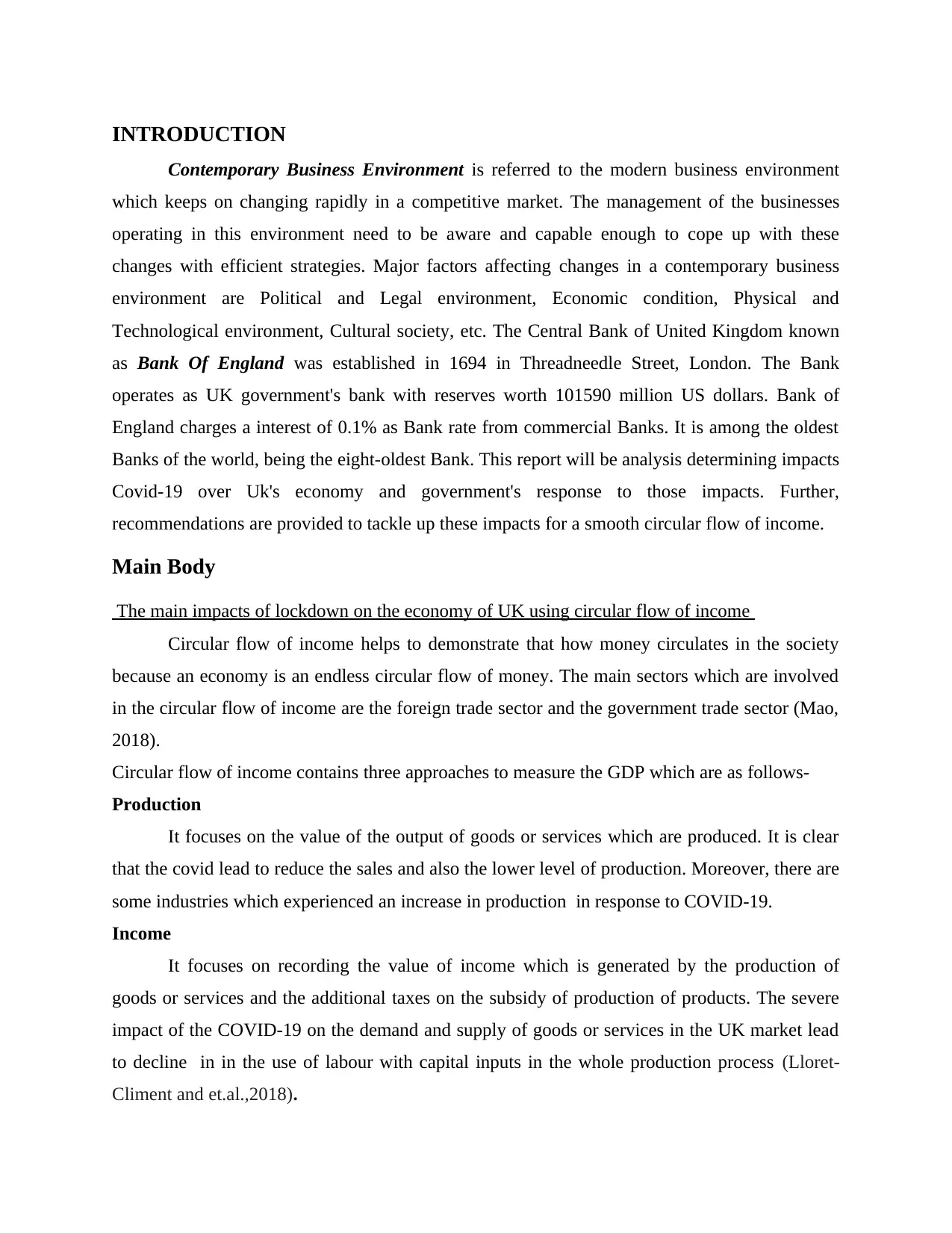
INTRODUCTION
Contemporary Business Environment is referred to the modern business environment
which keeps on changing rapidly in a competitive market. The management of the businesses
operating in this environment need to be aware and capable enough to cope up with these
changes with efficient strategies. Major factors affecting changes in a contemporary business
environment are Political and Legal environment, Economic condition, Physical and
Technological environment, Cultural society, etc. The Central Bank of United Kingdom known
as Bank Of England was established in 1694 in Threadneedle Street, London. The Bank
operates as UK government's bank with reserves worth 101590 million US dollars. Bank of
England charges a interest of 0.1% as Bank rate from commercial Banks. It is among the oldest
Banks of the world, being the eight-oldest Bank. This report will be analysis determining impacts
Covid-19 over Uk's economy and government's response to those impacts. Further,
recommendations are provided to tackle up these impacts for a smooth circular flow of income.
Main Body
The main impacts of lockdown on the economy of UK using circular flow of income
Circular flow of income helps to demonstrate that how money circulates in the society
because an economy is an endless circular flow of money. The main sectors which are involved
in the circular flow of income are the foreign trade sector and the government trade sector (Mao,
2018).
Circular flow of income contains three approaches to measure the GDP which are as follows-
Production
It focuses on the value of the output of goods or services which are produced. It is clear
that the covid lead to reduce the sales and also the lower level of production. Moreover, there are
some industries which experienced an increase in production in response to COVID-19.
Income
It focuses on recording the value of income which is generated by the production of
goods or services and the additional taxes on the subsidy of production of products. The severe
impact of the COVID-19 on the demand and supply of goods or services in the UK market lead
to decline in in the use of labour with capital inputs in the whole production process (Lloret‐
Climent and et.al.,2018).
Contemporary Business Environment is referred to the modern business environment
which keeps on changing rapidly in a competitive market. The management of the businesses
operating in this environment need to be aware and capable enough to cope up with these
changes with efficient strategies. Major factors affecting changes in a contemporary business
environment are Political and Legal environment, Economic condition, Physical and
Technological environment, Cultural society, etc. The Central Bank of United Kingdom known
as Bank Of England was established in 1694 in Threadneedle Street, London. The Bank
operates as UK government's bank with reserves worth 101590 million US dollars. Bank of
England charges a interest of 0.1% as Bank rate from commercial Banks. It is among the oldest
Banks of the world, being the eight-oldest Bank. This report will be analysis determining impacts
Covid-19 over Uk's economy and government's response to those impacts. Further,
recommendations are provided to tackle up these impacts for a smooth circular flow of income.
Main Body
The main impacts of lockdown on the economy of UK using circular flow of income
Circular flow of income helps to demonstrate that how money circulates in the society
because an economy is an endless circular flow of money. The main sectors which are involved
in the circular flow of income are the foreign trade sector and the government trade sector (Mao,
2018).
Circular flow of income contains three approaches to measure the GDP which are as follows-
Production
It focuses on the value of the output of goods or services which are produced. It is clear
that the covid lead to reduce the sales and also the lower level of production. Moreover, there are
some industries which experienced an increase in production in response to COVID-19.
Income
It focuses on recording the value of income which is generated by the production of
goods or services and the additional taxes on the subsidy of production of products. The severe
impact of the COVID-19 on the demand and supply of goods or services in the UK market lead
to decline in in the use of labour with capital inputs in the whole production process (Lloret‐
Climent and et.al.,2018).
⊘ This is a preview!⊘
Do you want full access?
Subscribe today to unlock all pages.

Trusted by 1+ million students worldwide
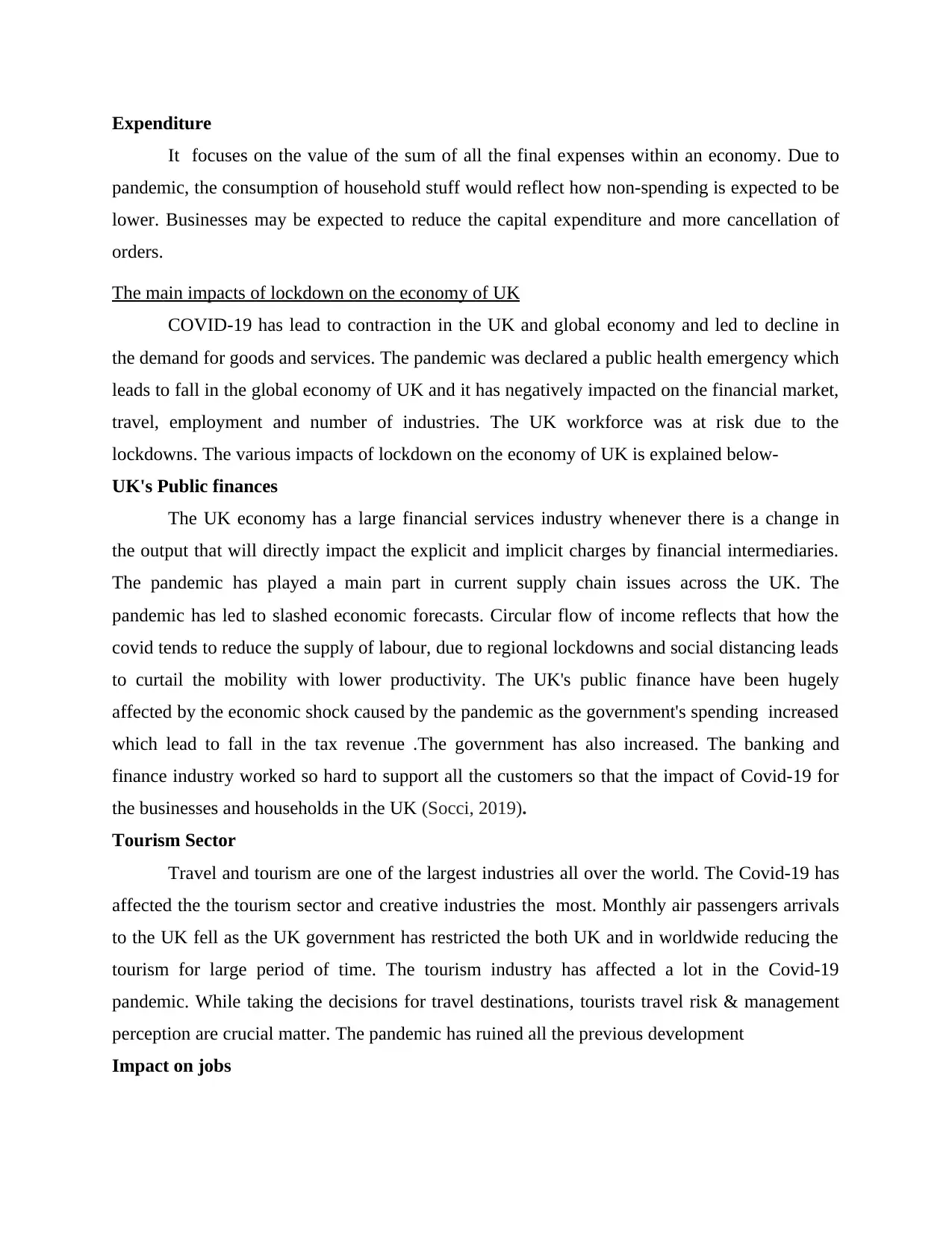
Expenditure
It focuses on the value of the sum of all the final expenses within an economy. Due to
pandemic, the consumption of household stuff would reflect how non-spending is expected to be
lower. Businesses may be expected to reduce the capital expenditure and more cancellation of
orders.
The main impacts of lockdown on the economy of UK
COVID-19 has lead to contraction in the UK and global economy and led to decline in
the demand for goods and services. The pandemic was declared a public health emergency which
leads to fall in the global economy of UK and it has negatively impacted on the financial market,
travel, employment and number of industries. The UK workforce was at risk due to the
lockdowns. The various impacts of lockdown on the economy of UK is explained below-
UK's Public finances
The UK economy has a large financial services industry whenever there is a change in
the output that will directly impact the explicit and implicit charges by financial intermediaries.
The pandemic has played a main part in current supply chain issues across the UK. The
pandemic has led to slashed economic forecasts. Circular flow of income reflects that how the
covid tends to reduce the supply of labour, due to regional lockdowns and social distancing leads
to curtail the mobility with lower productivity. The UK's public finance have been hugely
affected by the economic shock caused by the pandemic as the government's spending increased
which lead to fall in the tax revenue .The government has also increased. The banking and
finance industry worked so hard to support all the customers so that the impact of Covid-19 for
the businesses and households in the UK (Socci, 2019).
Tourism Sector
Travel and tourism are one of the largest industries all over the world. The Covid-19 has
affected the the tourism sector and creative industries the most. Monthly air passengers arrivals
to the UK fell as the UK government has restricted the both UK and in worldwide reducing the
tourism for large period of time. The tourism industry has affected a lot in the Covid-19
pandemic. While taking the decisions for travel destinations, tourists travel risk & management
perception are crucial matter. The pandemic has ruined all the previous development
Impact on jobs
It focuses on the value of the sum of all the final expenses within an economy. Due to
pandemic, the consumption of household stuff would reflect how non-spending is expected to be
lower. Businesses may be expected to reduce the capital expenditure and more cancellation of
orders.
The main impacts of lockdown on the economy of UK
COVID-19 has lead to contraction in the UK and global economy and led to decline in
the demand for goods and services. The pandemic was declared a public health emergency which
leads to fall in the global economy of UK and it has negatively impacted on the financial market,
travel, employment and number of industries. The UK workforce was at risk due to the
lockdowns. The various impacts of lockdown on the economy of UK is explained below-
UK's Public finances
The UK economy has a large financial services industry whenever there is a change in
the output that will directly impact the explicit and implicit charges by financial intermediaries.
The pandemic has played a main part in current supply chain issues across the UK. The
pandemic has led to slashed economic forecasts. Circular flow of income reflects that how the
covid tends to reduce the supply of labour, due to regional lockdowns and social distancing leads
to curtail the mobility with lower productivity. The UK's public finance have been hugely
affected by the economic shock caused by the pandemic as the government's spending increased
which lead to fall in the tax revenue .The government has also increased. The banking and
finance industry worked so hard to support all the customers so that the impact of Covid-19 for
the businesses and households in the UK (Socci, 2019).
Tourism Sector
Travel and tourism are one of the largest industries all over the world. The Covid-19 has
affected the the tourism sector and creative industries the most. Monthly air passengers arrivals
to the UK fell as the UK government has restricted the both UK and in worldwide reducing the
tourism for large period of time. The tourism industry has affected a lot in the Covid-19
pandemic. While taking the decisions for travel destinations, tourists travel risk & management
perception are crucial matter. The pandemic has ruined all the previous development
Impact on jobs
Paraphrase This Document
Need a fresh take? Get an instant paraphrase of this document with our AI Paraphraser
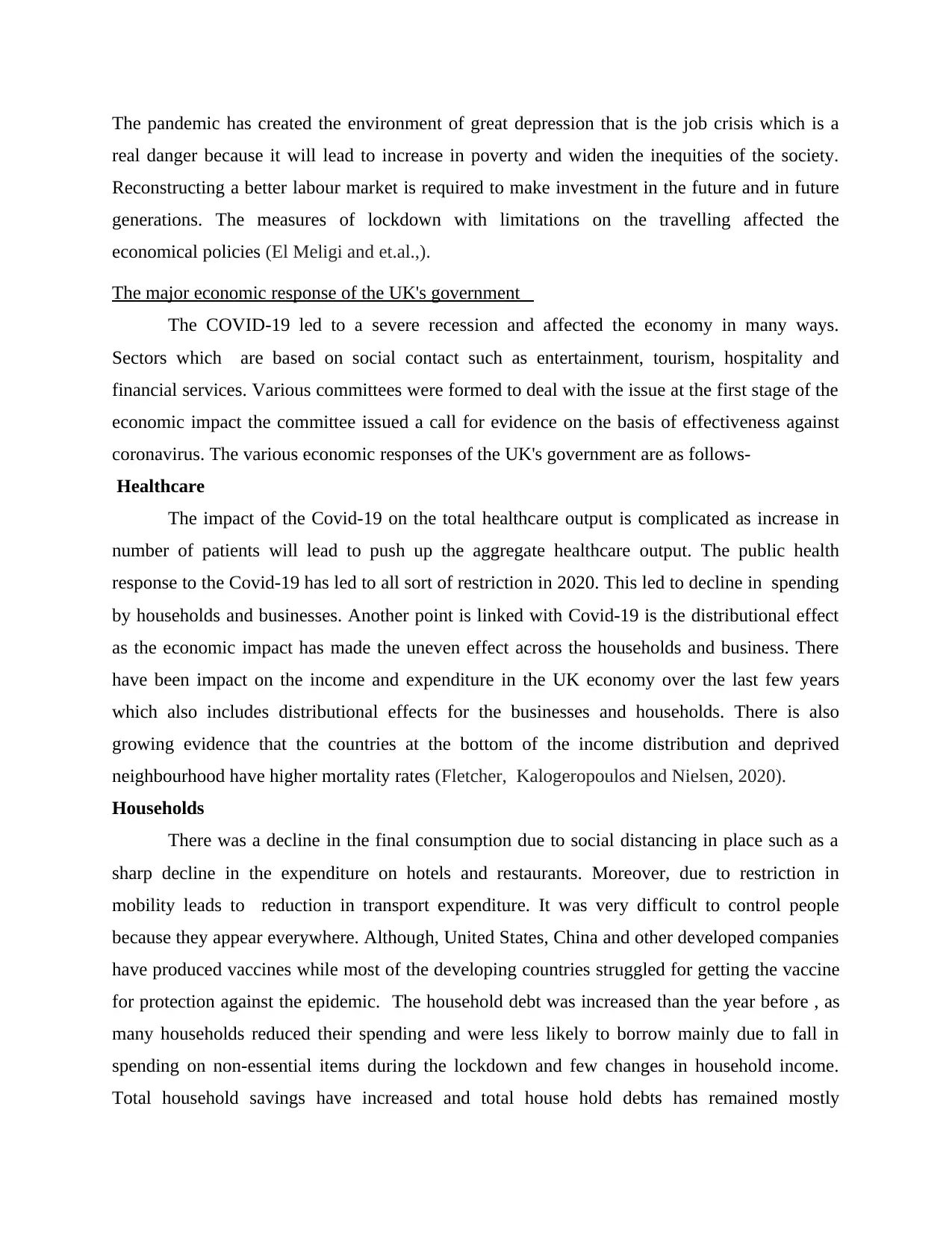
The pandemic has created the environment of great depression that is the job crisis which is a
real danger because it will lead to increase in poverty and widen the inequities of the society.
Reconstructing a better labour market is required to make investment in the future and in future
generations. The measures of lockdown with limitations on the travelling affected the
economical policies (El Meligi and et.al.,).
The major economic response of the UK's government
The COVID-19 led to a severe recession and affected the economy in many ways.
Sectors which are based on social contact such as entertainment, tourism, hospitality and
financial services. Various committees were formed to deal with the issue at the first stage of the
economic impact the committee issued a call for evidence on the basis of effectiveness against
coronavirus. The various economic responses of the UK's government are as follows-
Healthcare
The impact of the Covid-19 on the total healthcare output is complicated as increase in
number of patients will lead to push up the aggregate healthcare output. The public health
response to the Covid-19 has led to all sort of restriction in 2020. This led to decline in spending
by households and businesses. Another point is linked with Covid-19 is the distributional effect
as the economic impact has made the uneven effect across the households and business. There
have been impact on the income and expenditure in the UK economy over the last few years
which also includes distributional effects for the businesses and households. There is also
growing evidence that the countries at the bottom of the income distribution and deprived
neighbourhood have higher mortality rates (Fletcher, Kalogeropoulos and Nielsen, 2020).
Households
There was a decline in the final consumption due to social distancing in place such as a
sharp decline in the expenditure on hotels and restaurants. Moreover, due to restriction in
mobility leads to reduction in transport expenditure. It was very difficult to control people
because they appear everywhere. Although, United States, China and other developed companies
have produced vaccines while most of the developing countries struggled for getting the vaccine
for protection against the epidemic. The household debt was increased than the year before , as
many households reduced their spending and were less likely to borrow mainly due to fall in
spending on non-essential items during the lockdown and few changes in household income.
Total household savings have increased and total house hold debts has remained mostly
real danger because it will lead to increase in poverty and widen the inequities of the society.
Reconstructing a better labour market is required to make investment in the future and in future
generations. The measures of lockdown with limitations on the travelling affected the
economical policies (El Meligi and et.al.,).
The major economic response of the UK's government
The COVID-19 led to a severe recession and affected the economy in many ways.
Sectors which are based on social contact such as entertainment, tourism, hospitality and
financial services. Various committees were formed to deal with the issue at the first stage of the
economic impact the committee issued a call for evidence on the basis of effectiveness against
coronavirus. The various economic responses of the UK's government are as follows-
Healthcare
The impact of the Covid-19 on the total healthcare output is complicated as increase in
number of patients will lead to push up the aggregate healthcare output. The public health
response to the Covid-19 has led to all sort of restriction in 2020. This led to decline in spending
by households and businesses. Another point is linked with Covid-19 is the distributional effect
as the economic impact has made the uneven effect across the households and business. There
have been impact on the income and expenditure in the UK economy over the last few years
which also includes distributional effects for the businesses and households. There is also
growing evidence that the countries at the bottom of the income distribution and deprived
neighbourhood have higher mortality rates (Fletcher, Kalogeropoulos and Nielsen, 2020).
Households
There was a decline in the final consumption due to social distancing in place such as a
sharp decline in the expenditure on hotels and restaurants. Moreover, due to restriction in
mobility leads to reduction in transport expenditure. It was very difficult to control people
because they appear everywhere. Although, United States, China and other developed companies
have produced vaccines while most of the developing countries struggled for getting the vaccine
for protection against the epidemic. The household debt was increased than the year before , as
many households reduced their spending and were less likely to borrow mainly due to fall in
spending on non-essential items during the lockdown and few changes in household income.
Total household savings have increased and total house hold debts has remained mostly
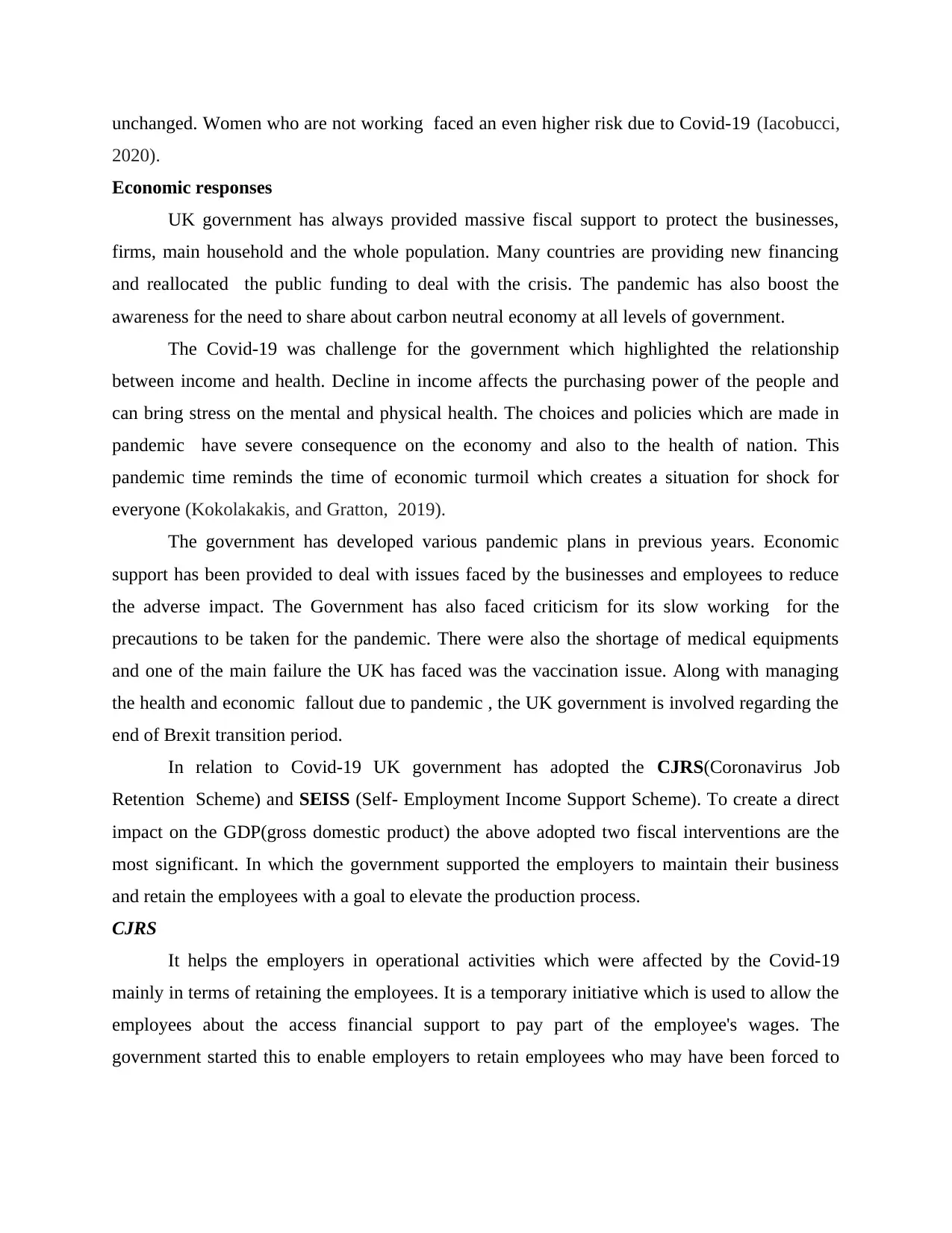
unchanged. Women who are not working faced an even higher risk due to Covid-19 (Iacobucci,
2020).
Economic responses
UK government has always provided massive fiscal support to protect the businesses,
firms, main household and the whole population. Many countries are providing new financing
and reallocated the public funding to deal with the crisis. The pandemic has also boost the
awareness for the need to share about carbon neutral economy at all levels of government.
The Covid-19 was challenge for the government which highlighted the relationship
between income and health. Decline in income affects the purchasing power of the people and
can bring stress on the mental and physical health. The choices and policies which are made in
pandemic have severe consequence on the economy and also to the health of nation. This
pandemic time reminds the time of economic turmoil which creates a situation for shock for
everyone (Kokolakakis, and Gratton, 2019).
The government has developed various pandemic plans in previous years. Economic
support has been provided to deal with issues faced by the businesses and employees to reduce
the adverse impact. The Government has also faced criticism for its slow working for the
precautions to be taken for the pandemic. There were also the shortage of medical equipments
and one of the main failure the UK has faced was the vaccination issue. Along with managing
the health and economic fallout due to pandemic , the UK government is involved regarding the
end of Brexit transition period.
In relation to Covid-19 UK government has adopted the CJRS(Coronavirus Job
Retention Scheme) and SEISS (Self- Employment Income Support Scheme). To create a direct
impact on the GDP(gross domestic product) the above adopted two fiscal interventions are the
most significant. In which the government supported the employers to maintain their business
and retain the employees with a goal to elevate the production process.
CJRS
It helps the employers in operational activities which were affected by the Covid-19
mainly in terms of retaining the employees. It is a temporary initiative which is used to allow the
employees about the access financial support to pay part of the employee's wages. The
government started this to enable employers to retain employees who may have been forced to
2020).
Economic responses
UK government has always provided massive fiscal support to protect the businesses,
firms, main household and the whole population. Many countries are providing new financing
and reallocated the public funding to deal with the crisis. The pandemic has also boost the
awareness for the need to share about carbon neutral economy at all levels of government.
The Covid-19 was challenge for the government which highlighted the relationship
between income and health. Decline in income affects the purchasing power of the people and
can bring stress on the mental and physical health. The choices and policies which are made in
pandemic have severe consequence on the economy and also to the health of nation. This
pandemic time reminds the time of economic turmoil which creates a situation for shock for
everyone (Kokolakakis, and Gratton, 2019).
The government has developed various pandemic plans in previous years. Economic
support has been provided to deal with issues faced by the businesses and employees to reduce
the adverse impact. The Government has also faced criticism for its slow working for the
precautions to be taken for the pandemic. There were also the shortage of medical equipments
and one of the main failure the UK has faced was the vaccination issue. Along with managing
the health and economic fallout due to pandemic , the UK government is involved regarding the
end of Brexit transition period.
In relation to Covid-19 UK government has adopted the CJRS(Coronavirus Job
Retention Scheme) and SEISS (Self- Employment Income Support Scheme). To create a direct
impact on the GDP(gross domestic product) the above adopted two fiscal interventions are the
most significant. In which the government supported the employers to maintain their business
and retain the employees with a goal to elevate the production process.
CJRS
It helps the employers in operational activities which were affected by the Covid-19
mainly in terms of retaining the employees. It is a temporary initiative which is used to allow the
employees about the access financial support to pay part of the employee's wages. The
government started this to enable employers to retain employees who may have been forced to
⊘ This is a preview!⊘
Do you want full access?
Subscribe today to unlock all pages.

Trusted by 1+ million students worldwide
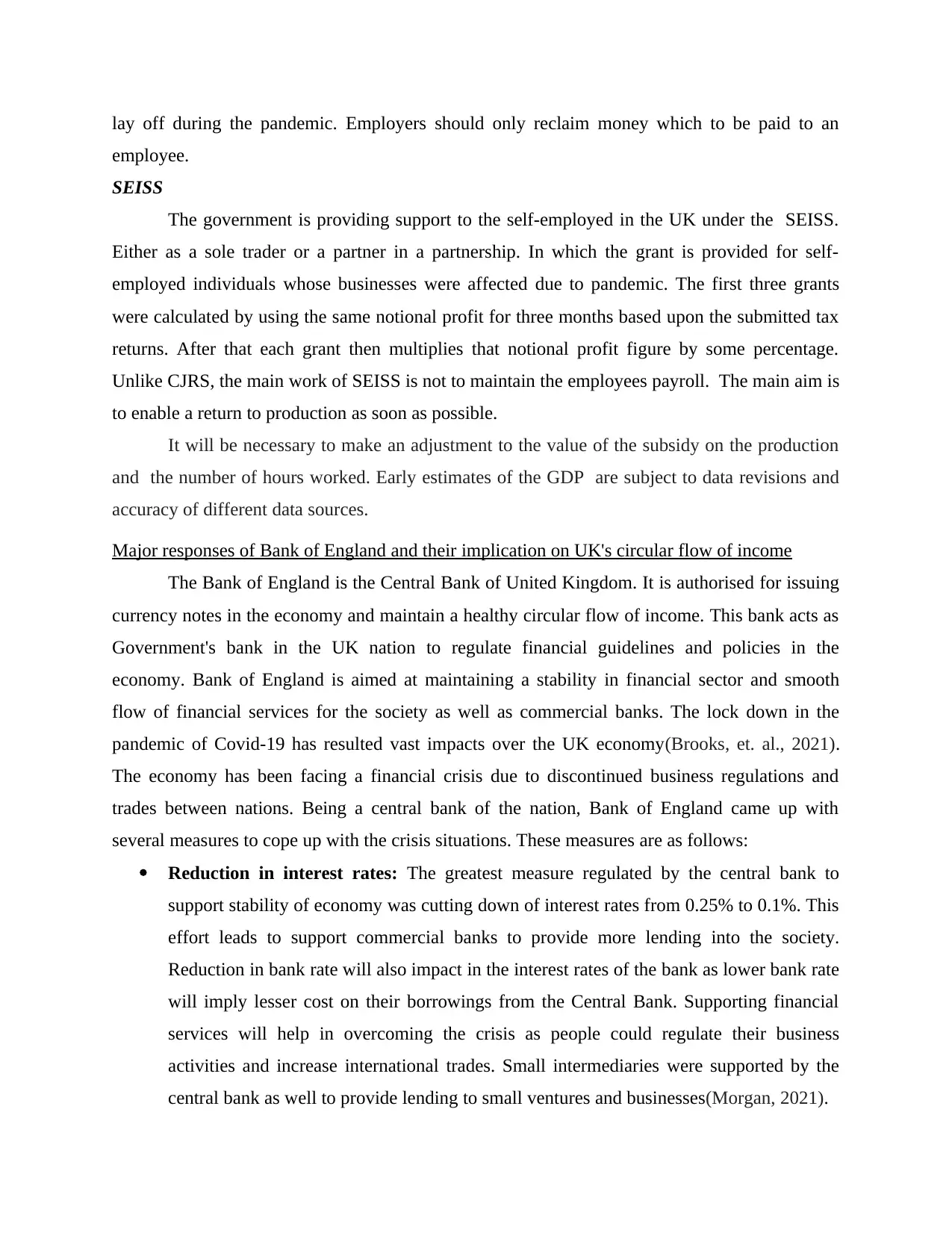
lay off during the pandemic. Employers should only reclaim money which to be paid to an
employee.
SEISS
The government is providing support to the self-employed in the UK under the SEISS.
Either as a sole trader or a partner in a partnership. In which the grant is provided for self-
employed individuals whose businesses were affected due to pandemic. The first three grants
were calculated by using the same notional profit for three months based upon the submitted tax
returns. After that each grant then multiplies that notional profit figure by some percentage.
Unlike CJRS, the main work of SEISS is not to maintain the employees payroll. The main aim is
to enable a return to production as soon as possible.
It will be necessary to make an adjustment to the value of the subsidy on the production
and the number of hours worked. Early estimates of the GDP are subject to data revisions and
accuracy of different data sources.
Major responses of Bank of England and their implication on UK's circular flow of income
The Bank of England is the Central Bank of United Kingdom. It is authorised for issuing
currency notes in the economy and maintain a healthy circular flow of income. This bank acts as
Government's bank in the UK nation to regulate financial guidelines and policies in the
economy. Bank of England is aimed at maintaining a stability in financial sector and smooth
flow of financial services for the society as well as commercial banks. The lock down in the
pandemic of Covid-19 has resulted vast impacts over the UK economy(Brooks, et. al., 2021).
The economy has been facing a financial crisis due to discontinued business regulations and
trades between nations. Being a central bank of the nation, Bank of England came up with
several measures to cope up with the crisis situations. These measures are as follows:
Reduction in interest rates: The greatest measure regulated by the central bank to
support stability of economy was cutting down of interest rates from 0.25% to 0.1%. This
effort leads to support commercial banks to provide more lending into the society.
Reduction in bank rate will also impact in the interest rates of the bank as lower bank rate
will imply lesser cost on their borrowings from the Central Bank. Supporting financial
services will help in overcoming the crisis as people could regulate their business
activities and increase international trades. Small intermediaries were supported by the
central bank as well to provide lending to small ventures and businesses(Morgan, 2021).
employee.
SEISS
The government is providing support to the self-employed in the UK under the SEISS.
Either as a sole trader or a partner in a partnership. In which the grant is provided for self-
employed individuals whose businesses were affected due to pandemic. The first three grants
were calculated by using the same notional profit for three months based upon the submitted tax
returns. After that each grant then multiplies that notional profit figure by some percentage.
Unlike CJRS, the main work of SEISS is not to maintain the employees payroll. The main aim is
to enable a return to production as soon as possible.
It will be necessary to make an adjustment to the value of the subsidy on the production
and the number of hours worked. Early estimates of the GDP are subject to data revisions and
accuracy of different data sources.
Major responses of Bank of England and their implication on UK's circular flow of income
The Bank of England is the Central Bank of United Kingdom. It is authorised for issuing
currency notes in the economy and maintain a healthy circular flow of income. This bank acts as
Government's bank in the UK nation to regulate financial guidelines and policies in the
economy. Bank of England is aimed at maintaining a stability in financial sector and smooth
flow of financial services for the society as well as commercial banks. The lock down in the
pandemic of Covid-19 has resulted vast impacts over the UK economy(Brooks, et. al., 2021).
The economy has been facing a financial crisis due to discontinued business regulations and
trades between nations. Being a central bank of the nation, Bank of England came up with
several measures to cope up with the crisis situations. These measures are as follows:
Reduction in interest rates: The greatest measure regulated by the central bank to
support stability of economy was cutting down of interest rates from 0.25% to 0.1%. This
effort leads to support commercial banks to provide more lending into the society.
Reduction in bank rate will also impact in the interest rates of the bank as lower bank rate
will imply lesser cost on their borrowings from the Central Bank. Supporting financial
services will help in overcoming the crisis as people could regulate their business
activities and increase international trades. Small intermediaries were supported by the
central bank as well to provide lending to small ventures and businesses(Morgan, 2021).
Paraphrase This Document
Need a fresh take? Get an instant paraphrase of this document with our AI Paraphraser
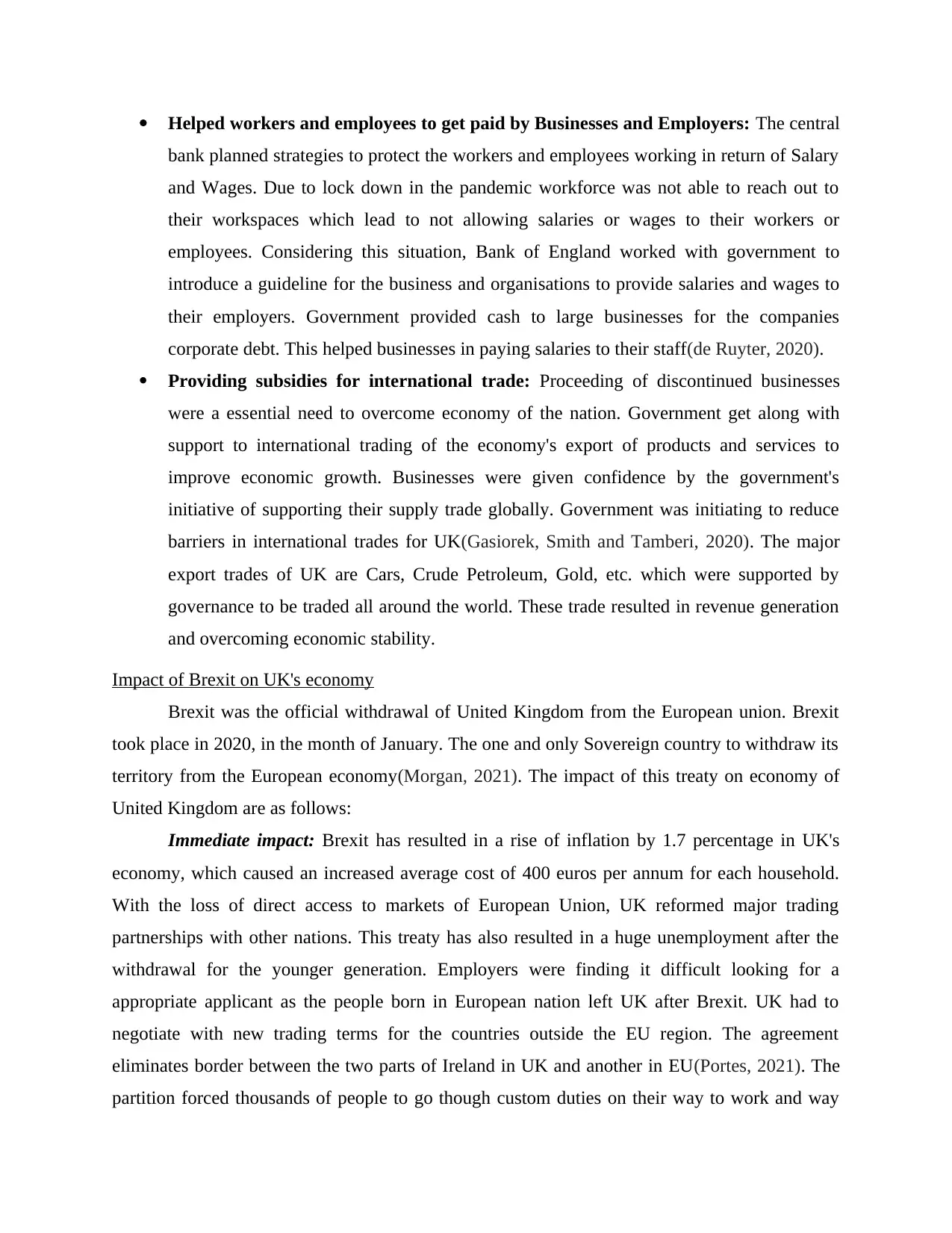
Helped workers and employees to get paid by Businesses and Employers: The central
bank planned strategies to protect the workers and employees working in return of Salary
and Wages. Due to lock down in the pandemic workforce was not able to reach out to
their workspaces which lead to not allowing salaries or wages to their workers or
employees. Considering this situation, Bank of England worked with government to
introduce a guideline for the business and organisations to provide salaries and wages to
their employers. Government provided cash to large businesses for the companies
corporate debt. This helped businesses in paying salaries to their staff(de Ruyter, 2020).
Providing subsidies for international trade: Proceeding of discontinued businesses
were a essential need to overcome economy of the nation. Government get along with
support to international trading of the economy's export of products and services to
improve economic growth. Businesses were given confidence by the government's
initiative of supporting their supply trade globally. Government was initiating to reduce
barriers in international trades for UK(Gasiorek, Smith and Tamberi, 2020). The major
export trades of UK are Cars, Crude Petroleum, Gold, etc. which were supported by
governance to be traded all around the world. These trade resulted in revenue generation
and overcoming economic stability.
Impact of Brexit on UK's economy
Brexit was the official withdrawal of United Kingdom from the European union. Brexit
took place in 2020, in the month of January. The one and only Sovereign country to withdraw its
territory from the European economy(Morgan, 2021). The impact of this treaty on economy of
United Kingdom are as follows:
Immediate impact: Brexit has resulted in a rise of inflation by 1.7 percentage in UK's
economy, which caused an increased average cost of 400 euros per annum for each household.
With the loss of direct access to markets of European Union, UK reformed major trading
partnerships with other nations. This treaty has also resulted in a huge unemployment after the
withdrawal for the younger generation. Employers were finding it difficult looking for a
appropriate applicant as the people born in European nation left UK after Brexit. UK had to
negotiate with new trading terms for the countries outside the EU region. The agreement
eliminates border between the two parts of Ireland in UK and another in EU(Portes, 2021). The
partition forced thousands of people to go though custom duties on their way to work and way
bank planned strategies to protect the workers and employees working in return of Salary
and Wages. Due to lock down in the pandemic workforce was not able to reach out to
their workspaces which lead to not allowing salaries or wages to their workers or
employees. Considering this situation, Bank of England worked with government to
introduce a guideline for the business and organisations to provide salaries and wages to
their employers. Government provided cash to large businesses for the companies
corporate debt. This helped businesses in paying salaries to their staff(de Ruyter, 2020).
Providing subsidies for international trade: Proceeding of discontinued businesses
were a essential need to overcome economy of the nation. Government get along with
support to international trading of the economy's export of products and services to
improve economic growth. Businesses were given confidence by the government's
initiative of supporting their supply trade globally. Government was initiating to reduce
barriers in international trades for UK(Gasiorek, Smith and Tamberi, 2020). The major
export trades of UK are Cars, Crude Petroleum, Gold, etc. which were supported by
governance to be traded all around the world. These trade resulted in revenue generation
and overcoming economic stability.
Impact of Brexit on UK's economy
Brexit was the official withdrawal of United Kingdom from the European union. Brexit
took place in 2020, in the month of January. The one and only Sovereign country to withdraw its
territory from the European economy(Morgan, 2021). The impact of this treaty on economy of
United Kingdom are as follows:
Immediate impact: Brexit has resulted in a rise of inflation by 1.7 percentage in UK's
economy, which caused an increased average cost of 400 euros per annum for each household.
With the loss of direct access to markets of European Union, UK reformed major trading
partnerships with other nations. This treaty has also resulted in a huge unemployment after the
withdrawal for the younger generation. Employers were finding it difficult looking for a
appropriate applicant as the people born in European nation left UK after Brexit. UK had to
negotiate with new trading terms for the countries outside the EU region. The agreement
eliminates border between the two parts of Ireland in UK and another in EU(Portes, 2021). The
partition forced thousands of people to go though custom duties on their way to work and way
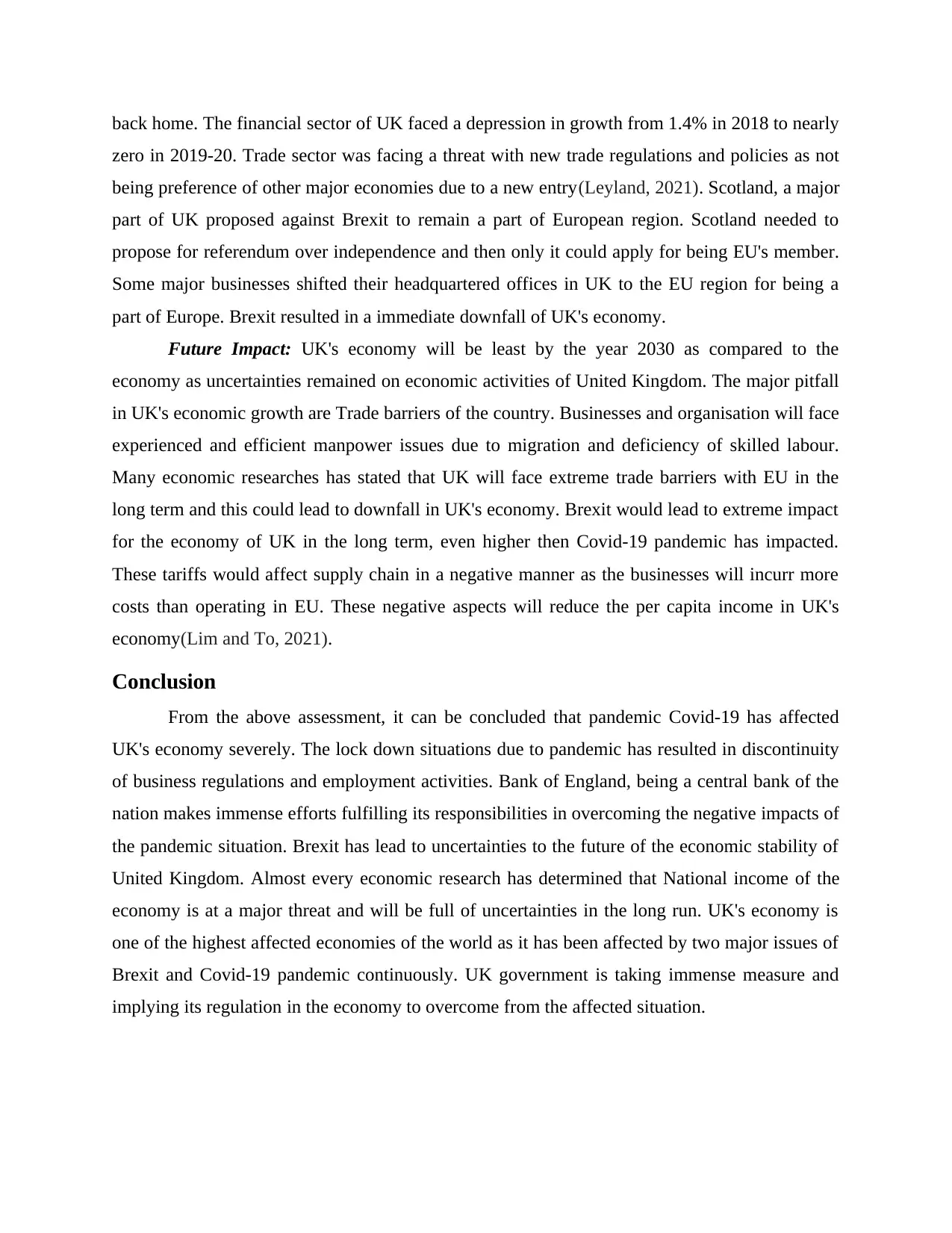
back home. The financial sector of UK faced a depression in growth from 1.4% in 2018 to nearly
zero in 2019-20. Trade sector was facing a threat with new trade regulations and policies as not
being preference of other major economies due to a new entry(Leyland, 2021). Scotland, a major
part of UK proposed against Brexit to remain a part of European region. Scotland needed to
propose for referendum over independence and then only it could apply for being EU's member.
Some major businesses shifted their headquartered offices in UK to the EU region for being a
part of Europe. Brexit resulted in a immediate downfall of UK's economy.
Future Impact: UK's economy will be least by the year 2030 as compared to the
economy as uncertainties remained on economic activities of United Kingdom. The major pitfall
in UK's economic growth are Trade barriers of the country. Businesses and organisation will face
experienced and efficient manpower issues due to migration and deficiency of skilled labour.
Many economic researches has stated that UK will face extreme trade barriers with EU in the
long term and this could lead to downfall in UK's economy. Brexit would lead to extreme impact
for the economy of UK in the long term, even higher then Covid-19 pandemic has impacted.
These tariffs would affect supply chain in a negative manner as the businesses will incurr more
costs than operating in EU. These negative aspects will reduce the per capita income in UK's
economy(Lim and To, 2021).
Conclusion
From the above assessment, it can be concluded that pandemic Covid-19 has affected
UK's economy severely. The lock down situations due to pandemic has resulted in discontinuity
of business regulations and employment activities. Bank of England, being a central bank of the
nation makes immense efforts fulfilling its responsibilities in overcoming the negative impacts of
the pandemic situation. Brexit has lead to uncertainties to the future of the economic stability of
United Kingdom. Almost every economic research has determined that National income of the
economy is at a major threat and will be full of uncertainties in the long run. UK's economy is
one of the highest affected economies of the world as it has been affected by two major issues of
Brexit and Covid-19 pandemic continuously. UK government is taking immense measure and
implying its regulation in the economy to overcome from the affected situation.
zero in 2019-20. Trade sector was facing a threat with new trade regulations and policies as not
being preference of other major economies due to a new entry(Leyland, 2021). Scotland, a major
part of UK proposed against Brexit to remain a part of European region. Scotland needed to
propose for referendum over independence and then only it could apply for being EU's member.
Some major businesses shifted their headquartered offices in UK to the EU region for being a
part of Europe. Brexit resulted in a immediate downfall of UK's economy.
Future Impact: UK's economy will be least by the year 2030 as compared to the
economy as uncertainties remained on economic activities of United Kingdom. The major pitfall
in UK's economic growth are Trade barriers of the country. Businesses and organisation will face
experienced and efficient manpower issues due to migration and deficiency of skilled labour.
Many economic researches has stated that UK will face extreme trade barriers with EU in the
long term and this could lead to downfall in UK's economy. Brexit would lead to extreme impact
for the economy of UK in the long term, even higher then Covid-19 pandemic has impacted.
These tariffs would affect supply chain in a negative manner as the businesses will incurr more
costs than operating in EU. These negative aspects will reduce the per capita income in UK's
economy(Lim and To, 2021).
Conclusion
From the above assessment, it can be concluded that pandemic Covid-19 has affected
UK's economy severely. The lock down situations due to pandemic has resulted in discontinuity
of business regulations and employment activities. Bank of England, being a central bank of the
nation makes immense efforts fulfilling its responsibilities in overcoming the negative impacts of
the pandemic situation. Brexit has lead to uncertainties to the future of the economic stability of
United Kingdom. Almost every economic research has determined that National income of the
economy is at a major threat and will be full of uncertainties in the long run. UK's economy is
one of the highest affected economies of the world as it has been affected by two major issues of
Brexit and Covid-19 pandemic continuously. UK government is taking immense measure and
implying its regulation in the economy to overcome from the affected situation.
⊘ This is a preview!⊘
Do you want full access?
Subscribe today to unlock all pages.

Trusted by 1+ million students worldwide
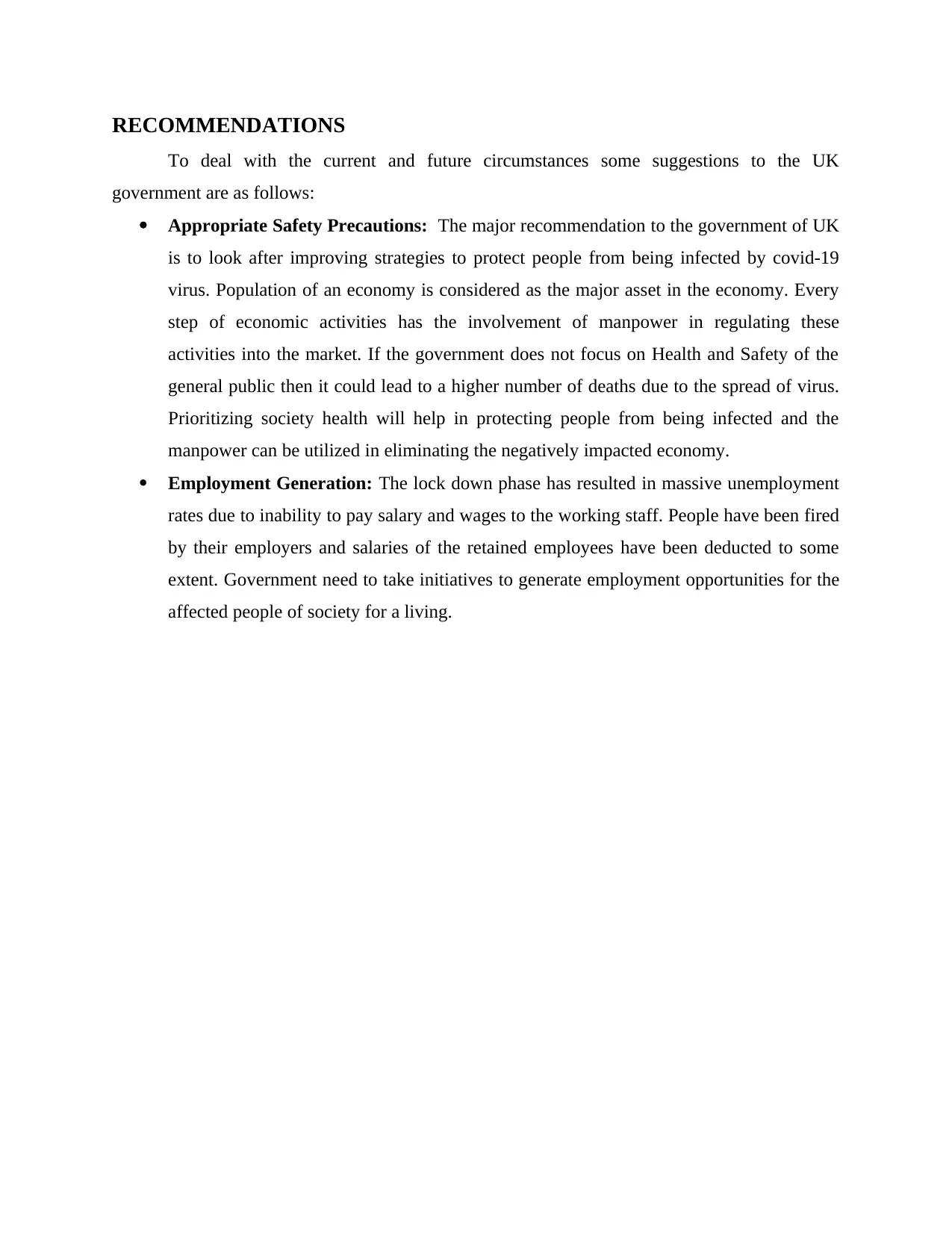
RECOMMENDATIONS
To deal with the current and future circumstances some suggestions to the UK
government are as follows:
Appropriate Safety Precautions: The major recommendation to the government of UK
is to look after improving strategies to protect people from being infected by covid-19
virus. Population of an economy is considered as the major asset in the economy. Every
step of economic activities has the involvement of manpower in regulating these
activities into the market. If the government does not focus on Health and Safety of the
general public then it could lead to a higher number of deaths due to the spread of virus.
Prioritizing society health will help in protecting people from being infected and the
manpower can be utilized in eliminating the negatively impacted economy.
Employment Generation: The lock down phase has resulted in massive unemployment
rates due to inability to pay salary and wages to the working staff. People have been fired
by their employers and salaries of the retained employees have been deducted to some
extent. Government need to take initiatives to generate employment opportunities for the
affected people of society for a living.
To deal with the current and future circumstances some suggestions to the UK
government are as follows:
Appropriate Safety Precautions: The major recommendation to the government of UK
is to look after improving strategies to protect people from being infected by covid-19
virus. Population of an economy is considered as the major asset in the economy. Every
step of economic activities has the involvement of manpower in regulating these
activities into the market. If the government does not focus on Health and Safety of the
general public then it could lead to a higher number of deaths due to the spread of virus.
Prioritizing society health will help in protecting people from being infected and the
manpower can be utilized in eliminating the negatively impacted economy.
Employment Generation: The lock down phase has resulted in massive unemployment
rates due to inability to pay salary and wages to the working staff. People have been fired
by their employers and salaries of the retained employees have been deducted to some
extent. Government need to take initiatives to generate employment opportunities for the
affected people of society for a living.
Paraphrase This Document
Need a fresh take? Get an instant paraphrase of this document with our AI Paraphraser
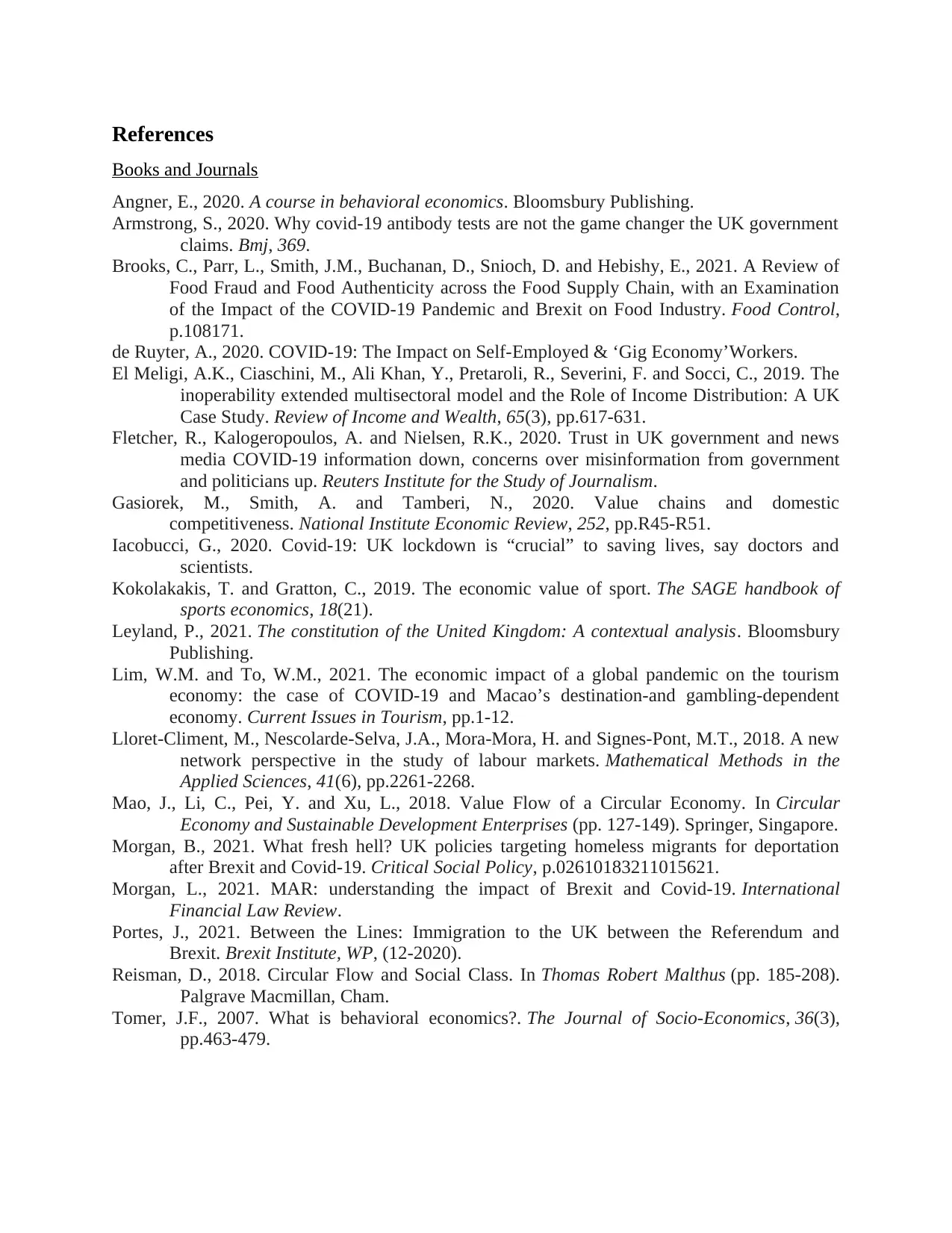
References
Books and Journals
Angner, E., 2020. A course in behavioral economics. Bloomsbury Publishing.
Armstrong, S., 2020. Why covid-19 antibody tests are not the game changer the UK government
claims. Bmj, 369.
Brooks, C., Parr, L., Smith, J.M., Buchanan, D., Snioch, D. and Hebishy, E., 2021. A Review of
Food Fraud and Food Authenticity across the Food Supply Chain, with an Examination
of the Impact of the COVID-19 Pandemic and Brexit on Food Industry. Food Control,
p.108171.
de Ruyter, A., 2020. COVID-19: The Impact on Self-Employed & ‘Gig Economy’Workers.
El Meligi, A.K., Ciaschini, M., Ali Khan, Y., Pretaroli, R., Severini, F. and Socci, C., 2019. The
inoperability extended multisectoral model and the Role of Income Distribution: A UK
Case Study. Review of Income and Wealth, 65(3), pp.617-631.
Fletcher, R., Kalogeropoulos, A. and Nielsen, R.K., 2020. Trust in UK government and news
media COVID-19 information down, concerns over misinformation from government
and politicians up. Reuters Institute for the Study of Journalism.
Gasiorek, M., Smith, A. and Tamberi, N., 2020. Value chains and domestic
competitiveness. National Institute Economic Review, 252, pp.R45-R51.
Iacobucci, G., 2020. Covid-19: UK lockdown is “crucial” to saving lives, say doctors and
scientists.
Kokolakakis, T. and Gratton, C., 2019. The economic value of sport. The SAGE handbook of
sports economics, 18(21).
Leyland, P., 2021. The constitution of the United Kingdom: A contextual analysis. Bloomsbury
Publishing.
Lim, W.M. and To, W.M., 2021. The economic impact of a global pandemic on the tourism
economy: the case of COVID-19 and Macao’s destination-and gambling-dependent
economy. Current Issues in Tourism, pp.1-12.
Lloret‐Climent, M., Nescolarde‐Selva, J.A., Mora‐Mora, H. and Signes‐Pont, M.T., 2018. A new
network perspective in the study of labour markets. Mathematical Methods in the
Applied Sciences, 41(6), pp.2261-2268.
Mao, J., Li, C., Pei, Y. and Xu, L., 2018. Value Flow of a Circular Economy. In Circular
Economy and Sustainable Development Enterprises (pp. 127-149). Springer, Singapore.
Morgan, B., 2021. What fresh hell? UK policies targeting homeless migrants for deportation
after Brexit and Covid-19. Critical Social Policy, p.02610183211015621.
Morgan, L., 2021. MAR: understanding the impact of Brexit and Covid-19. International
Financial Law Review.
Portes, J., 2021. Between the Lines: Immigration to the UK between the Referendum and
Brexit. Brexit Institute, WP, (12-2020).
Reisman, D., 2018. Circular Flow and Social Class. In Thomas Robert Malthus (pp. 185-208).
Palgrave Macmillan, Cham.
Tomer, J.F., 2007. What is behavioral economics?. The Journal of Socio-Economics, 36(3),
pp.463-479.
Books and Journals
Angner, E., 2020. A course in behavioral economics. Bloomsbury Publishing.
Armstrong, S., 2020. Why covid-19 antibody tests are not the game changer the UK government
claims. Bmj, 369.
Brooks, C., Parr, L., Smith, J.M., Buchanan, D., Snioch, D. and Hebishy, E., 2021. A Review of
Food Fraud and Food Authenticity across the Food Supply Chain, with an Examination
of the Impact of the COVID-19 Pandemic and Brexit on Food Industry. Food Control,
p.108171.
de Ruyter, A., 2020. COVID-19: The Impact on Self-Employed & ‘Gig Economy’Workers.
El Meligi, A.K., Ciaschini, M., Ali Khan, Y., Pretaroli, R., Severini, F. and Socci, C., 2019. The
inoperability extended multisectoral model and the Role of Income Distribution: A UK
Case Study. Review of Income and Wealth, 65(3), pp.617-631.
Fletcher, R., Kalogeropoulos, A. and Nielsen, R.K., 2020. Trust in UK government and news
media COVID-19 information down, concerns over misinformation from government
and politicians up. Reuters Institute for the Study of Journalism.
Gasiorek, M., Smith, A. and Tamberi, N., 2020. Value chains and domestic
competitiveness. National Institute Economic Review, 252, pp.R45-R51.
Iacobucci, G., 2020. Covid-19: UK lockdown is “crucial” to saving lives, say doctors and
scientists.
Kokolakakis, T. and Gratton, C., 2019. The economic value of sport. The SAGE handbook of
sports economics, 18(21).
Leyland, P., 2021. The constitution of the United Kingdom: A contextual analysis. Bloomsbury
Publishing.
Lim, W.M. and To, W.M., 2021. The economic impact of a global pandemic on the tourism
economy: the case of COVID-19 and Macao’s destination-and gambling-dependent
economy. Current Issues in Tourism, pp.1-12.
Lloret‐Climent, M., Nescolarde‐Selva, J.A., Mora‐Mora, H. and Signes‐Pont, M.T., 2018. A new
network perspective in the study of labour markets. Mathematical Methods in the
Applied Sciences, 41(6), pp.2261-2268.
Mao, J., Li, C., Pei, Y. and Xu, L., 2018. Value Flow of a Circular Economy. In Circular
Economy and Sustainable Development Enterprises (pp. 127-149). Springer, Singapore.
Morgan, B., 2021. What fresh hell? UK policies targeting homeless migrants for deportation
after Brexit and Covid-19. Critical Social Policy, p.02610183211015621.
Morgan, L., 2021. MAR: understanding the impact of Brexit and Covid-19. International
Financial Law Review.
Portes, J., 2021. Between the Lines: Immigration to the UK between the Referendum and
Brexit. Brexit Institute, WP, (12-2020).
Reisman, D., 2018. Circular Flow and Social Class. In Thomas Robert Malthus (pp. 185-208).
Palgrave Macmillan, Cham.
Tomer, J.F., 2007. What is behavioral economics?. The Journal of Socio-Economics, 36(3),
pp.463-479.
1 out of 11
Related Documents
Your All-in-One AI-Powered Toolkit for Academic Success.
+13062052269
info@desklib.com
Available 24*7 on WhatsApp / Email
![[object Object]](/_next/static/media/star-bottom.7253800d.svg)
Unlock your academic potential
Copyright © 2020–2026 A2Z Services. All Rights Reserved. Developed and managed by ZUCOL.


